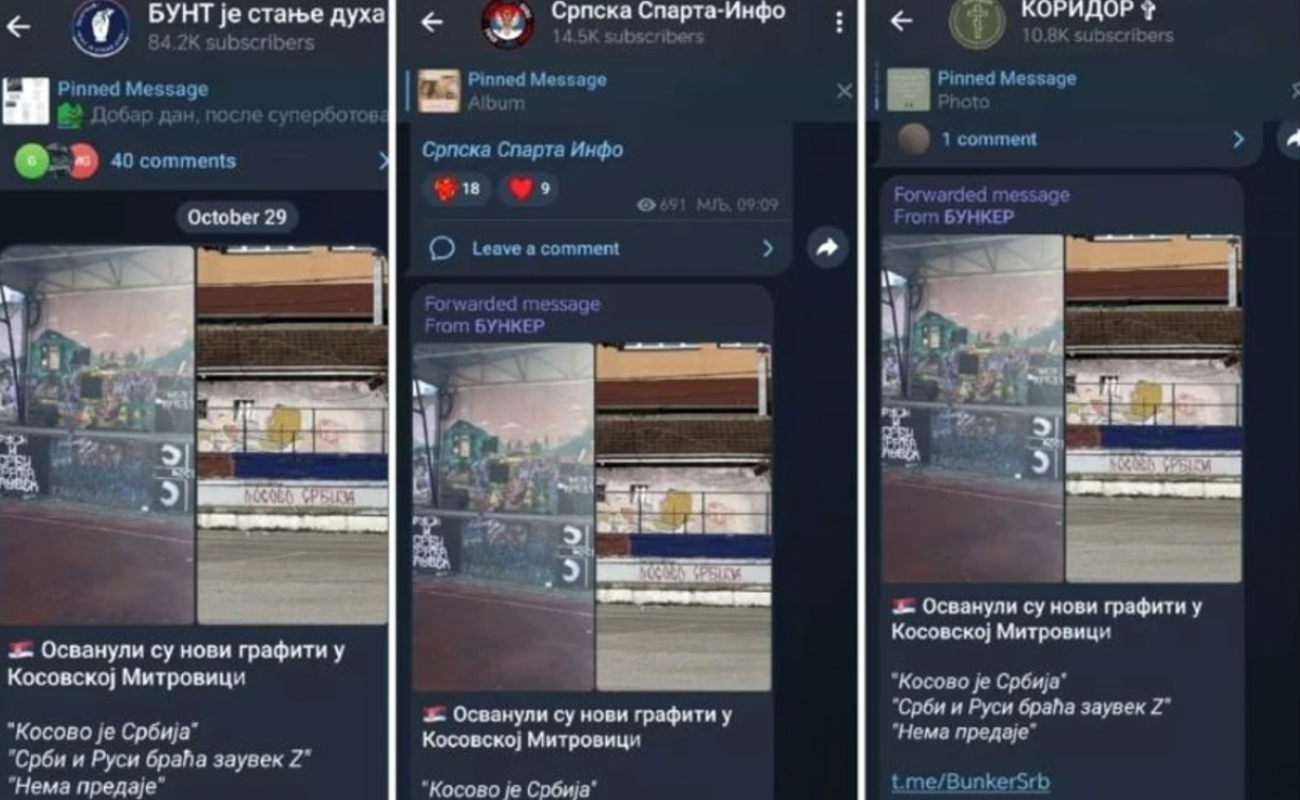Pro-Russian channels on Telegram as “information weapons” against Kosovo

Numerous Telegram channels that present themselves as “the voice of Russia in Serbia” or use Russian symbols, such as the flag, primarily focus on Kosovo.
They promote messages that delegitimize Kosovo’s institutions, deny its independence, and often fuel radical rhetoric, including calls for military intervention.
Hate speech against Albanians appears in almost every post related to Kosovo.
Most of these channels were created after the Russian invasion of Ukraine in February 2022 and today have between 10,000 and over 80,000 followers, who receive and distribute content daily.
The posts are clearly pro-Russian, support the invasion of Ukraine, oppose Serbia’s membership in the EU, and criticize cooperation with Western countries.
In recent years, especially in the Russian sphere, Telegram has become not only a messaging application but also a network for spreading political and propaganda content, thanks to user encryption and anonymity.
Ivana Stradner, a fellow at the non-governmental Foundation for Defense of Democracies in Washington, tells Radio Free Europe that official Moscow uses the channels on Telegram as an “information weapon.”
She says these channels pose a threat that ordinary citizens cannot see, feel, or touch—and for this reason, at first glance, the posts on this network look like conspiracy theories.
Stradner emphasizes that perception plays a key role, as social networks enable the shaping of people’s beliefs, “in the function of achieving security objectives.”
Coincidentally, the mass creation of Telegram channels that address the topic of Kosovo coincided with the rise in tensions in the north of the country, following the withdrawal of Serbs from Kosovar institutions in November 2022.
At that time, the Government of Kosovo insisted on implementing decisions that mainly concerned the consolidation of power in that region, where the majority population is Serb.
Another common characteristic of the pro-Russian Telegram channels that publish content about Kosovo is their coordinated action, meaning they act as a single network for spreading a specific narrative.
For example, on October 29, the “Bunker” channel on Telegram announced that new graffiti had appeared in North Mitrovica: “Kosovo is Serbia,” “Serbs and Russians are brothers forever Z,” “No Surrender.”
Within minutes, this post was also shared by the channels “Srpska Sparta-Info,” “Bunt je stanje duha,” “Koridor,” and “Code 17,” which together have over 130,000 users.
Radio Free Europe could not confirm this information with the Kosovo Police.
Channels like “Hrabro za Kosmet,” “Slovenski medved,” “Uz svoj narod,” and others also publish posts about Kosovo in the Serbian language.
There are also channels in the Russian language that publish news about Kosovo, such as “Сербия – LIVE” (Serbia Live), “Великая Россия” (Great Russia), and “Сербский Вестник” (Serbian Herald).
What are the main narratives?
One of the main narratives of the pro-Russian Telegram channels that publish news about Kosovo is the presentation of members of the Serb community as “victims of terror” by the Kosovo authorities.
Kosovo’s institutions are also delegitimized there, often being called by derogatory terms for Albanians.
For example, the “Bunker” channel posted news on October 28 about the construction of a school in North Mitrovica, writing:
” ‘Shiptar’ terrorists [Kosovo’s acting Minister of Internal Affairs, Xhelal] Svecla and [Mayor of North Mitrovica Municipality, Erden] Atic today laid the foundation stone for another ‘Shiptar’ school in the northern part of Mitrovica.”
On the same day, the “Koridor” channel published news about the training of the Kosovo Security Force at the training ground near Gjakova, but with hate speech.
” ‘Shiptar’ terrorists and NATO terrorists conducted joint military exercises in Gjakova,” the post stated.
Notably, the “Koridor” channel has been used previously by the “North Brigade,” which, along with “Civil Defense,” were declared terrorist organizations by the Government of Kosovo in June 2023.
At that time, it was announced on this channel that this would not prevent them from fighting “for Serbian-ness and unity,” but that, for security reasons, they would no longer publicly inform about their actions.
Calls for Lynching
One of the narratives on the Telegram channels is the naming of members of the Serb community who are employed in Kosovo’s institutions, or who, in some way, promote coexistence.
In late June, a statement by a Kosovo Police employee from the Serb community was published on the “Koridor” channel. He spoke publicly about the pressures he was experiencing, as he refused to leave his position during the collective withdrawal of Serbs from institutions in November 2022.
In the post, he was described as an “Albanian spy, who was offered to work in one of Serbia’s institutions,” but that “he chose to stay and work for the Albanian institutions, because, in addition to his salary, he also received a bonus for espionage.”
On the same channel, Serb lawyer Ivan Ninić was also described as a “lawyer paid by [Kosovo’s acting Prime Minister, Albin] Kurti,” who defends his collaborators, including Dragan Nikolic from Leposavic.
